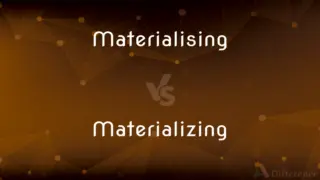Boxing in C# vs. Unboxing in C# — What's the Difference?
By Tayyaba Rehman — Published on January 14, 2024
Boxing in C# is converting a value type to object type, involving memory allocation on the heap. Unboxing in C# is the reverse, extracting the value type from the object.

Difference Between Boxing in C# and Unboxing in C#
Table of Contents
ADVERTISEMENT
Key Differences
Boxing in C# refers to the process where a value type (like int, char) is converted into an object or any interface type. This involves copying the value into a new object on the heap, which can lead to performance overhead. Unboxing in C# is the opposite process, where a boxed object is converted back into a value type. This requires a type cast and involves extracting the value from the heap.
Boxing in C# happens implicitly; for instance, when a value type is passed to a method expecting an object type. It is a way for value types to be treated as objects. Unboxing in C#, however, must be explicit through casting. It's necessary when you need to retrieve the original value type from an object.
Boxing in C# encapsulates the value type, creating a reference on the heap, thus can be slower due to memory allocation. Unboxing in C# retrieves the value from this reference, which can lead to InvalidCastException if the types don’t match.
Boxing in C# is useful for storing value types in collections like ArrayList, where objects are expected. It provides flexibility but at a cost of performance. Unboxing in C# is required to retrieve these values, ensuring the original data type is preserved.
Boxing in C# can lead to unexpected behaviors and performance issues if not used carefully, as it creates copies of the value type. Unboxing in C# also needs caution, as incorrect unboxing can result in runtime exceptions.
ADVERTISEMENT
Comparison Chart
Definition
Converting a value type to an object type
Converting an object type back to value type
Memory Allocation
Allocates memory on the heap
No new memory allocation
Performance
Slower due to heap allocation
Faster but requires caution
Type Conversion
Implicit
Explicit with casting
Error Prone
Less, mainly performance concerns
More, due to casting issues
Compare with Definitions
Boxing in C#
Storing value types in non-generic collections.
ArrayList list = new ArrayList(); list.Add(10); // Boxing
Unboxing in C#
Casting an object to its original value type.
Object o = 'a'; char c = (char)o; // Unboxing
Boxing in C#
Implicitly creating a reference type from a value type.
Double d = 3.14; object o = d; // Boxing
Unboxing in C#
Explicitly converting a reference type back to a value type.
Object o = true; bool b = (bool)o; // Unboxing
Boxing in C#
Implicit conversion of value type into System.Object.
Char c = 'a'; object o = c; // Boxing
Unboxing in C#
Extracting the value type from an object.
Object o = 123; int i = (int)o; // Unboxing
Boxing in C#
Converting a value type to an object type.
Int i = 123; object o = i; // Boxing
Unboxing in C#
Retrieving value types from non-generic collections.
ArrayList list = new ArrayList(); list.Add(10); int x = (int)list[0]; // Unboxing
Boxing in C#
Wrapping a value type in an object to use object features.
Int i = 5; object obj = i; obj.ToString(); // Boxing
Unboxing in C#
Explicit conversion of System.Object to a value type.
Object o = 45; int num = (int)o; // Unboxing
Common Curiosities
What is Boxing in C#?
Boxing is the process of converting a value type to an object type.
Is Boxing in C# automatic?
Yes, boxing in C# occurs implicitly.
Can Boxing in C# affect performance?
Yes, boxing can affect performance due to heap memory allocation.
What is a common use of Boxing in C#?
A common use is storing value types in non-generic collections like ArrayList.
Does Unboxing in C# require explicit casting?
Yes, unboxing requires an explicit cast to the desired value type.
What is the impact of Boxing in C# on garbage collection?
Boxing increases the workload of garbage collection due to additional heap allocations.
What is Unboxing in C#?
Unboxing is the process of converting an object type back to a value type.
Is Unboxing in C# error-prone?
Yes, unboxing can be error-prone due to potential casting issues.
Can Unboxing in C# result in a runtime exception?
Yes, incorrect unboxing can lead to runtime exceptions.
How does Boxing in C# work with value and reference types?
Boxing converts a value type into a reference type (object).
Does Boxing in C# create a new object in memory?
Yes, it creates a new object on the heap.
Can you unbox an object that was not boxed in C#?
No, attempting to unbox a non-boxed object will result in an exception.
Why is understanding Boxing and Unboxing in C# important?
Understanding these concepts is crucial for efficient memory management and avoiding runtime errors.
Why is type checking important in Unboxing in C#?
Type checking is crucial to avoid InvalidCastException during unboxing.
Is it possible to unbox into a different value type in C#?
No, the object must be unboxed to its original value type.
Share Your Discovery

Previous Comparison
Acetic Acid vs. Glacial Acetic Acid
Next Comparison
Materialising vs. MaterializingAuthor Spotlight
Written by
Tayyaba RehmanTayyaba Rehman is a distinguished writer, currently serving as a primary contributor to askdifference.com. As a researcher in semantics and etymology, Tayyaba's passion for the complexity of languages and their distinctions has found a perfect home on the platform. Tayyaba delves into the intricacies of language, distinguishing between commonly confused words and phrases, thereby providing clarity for readers worldwide.














































